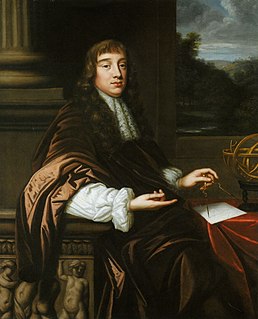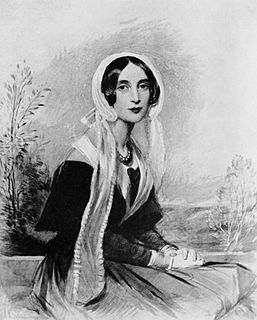A Quote by John Locke
Had you or I been born at the Bay of Soldania, possibly our Thoughts, and Notions, had not exceeded those brutish ones of the Hotentots that inhabit there: And had the Virginia King Apochancana, been educated in England, he had, perhaps been as knowing a Divine, and as good a Mathematician as any in it. The difference between him, and a more improved English-man, lying barely in this, That the exercise of his Facilities was bounded within the Ways, Modes, and Notions of his own Country, and never directed to any other or farther Enquiries.
Quote Topics
Related Quotes
It would perhaps not be amiss to point out that he had always tried to be a good dog. He had tried to do all the things his MAN and his WOMAN, and most of all his BOY, had asked or expected of him. He would have died for them, if that had been required. He had never wanted to kill anybody. He had been struck by something, possibly destiny, or fate, or only a degenerative nerve disease called rabies. Free will was not a factor.
There is scarce any one invention, which this nation has produced in our age, but it has some way or other been set forward by his assistance. ... He is indeed a man born for the good of mankind, and for the honour of his country. ... So I may thank God, that Dr. Wilkins was an Englishman, for wherever he had lived, there had been the chief seat of generous knowledge and true philosophy.
There were times when it appeared to Dorian Gray that the whole of history was merely the record of his own life, not as he had lived it in act and circumstand, but as his imagination had created it for him, as it had been in his brain and in his passions. He felt that he had known them all, those strange terrible figures that had passed across the stage of the world and made sin so marvellous, and evil so full of subtlety. It seemed to him that in some mysterious way their lives had been his own.
I was born on the 24th of September 1755 in the county of Fauquier, at that time one of the frontier counties of Virginia. My father possessed scarcely any fortune and had received a very limited education - but was a man to whom nature had been bountiful, and who had assiduously improved her gifts.
There was a man that hated his footprints and his shadow, so one day he thought that if he ran fast enough, his footprints and shadow would not be able to follow him and then he never ever had to look at them again. He ran and he ran as fast as he could, but the shadow and the footprints had no problems keeping up to him. And he ran even faster and all of a sudden he fell dead to the ground. But if he been standing still there hadn't been any footprints and if he had been resting under a tree his shadow had been swallowed of the trees shadow.
What a wonderful sleep it had been! Never had sleep so refreshed him, so renewed him, so rejuvenated him! Perhaps he had really died, perhaps he had been drowned and was reborn in another form. No, he recognized himself, he recognized his hands and feet, the place where he lay and the Self in his breast, Siddhartha, self-willed, individualistic. But this Siddhartha was somewhat changed, renewed. He had slept wonderfully. He was remarkably awake, happy and curious.
The lights were off so that his heads could avoid looking at each other because neither of them was currently a particular engaging sight, nor had they been since he had made the error of looking into his soul. It had indeed been an error. It had been late one night-- of course. It had been a difficult day-- of course. There had been soulful music playing on the ship's sound system-- of course. And he had, of course, been slightly drunk. In other words, all the usual conditions that bring on a bout of soul searching had applied, but it had, nevertheless, clearly been an error.
She had taken him for granted, she thought with surprise and shame, watching the flickering candlelight. She had assumed his kindness was so natural and so innate, she had never asked herself whether it cost him any effort. Any effort to stand between Will and the world, protecting each of them from the other. Any effort to accept the loss of his family with equanimity. Any effort to remain cheerful and calm in the face of his own dying.
The occurrence of an event is not the same thing as knowing what it is that one has lived through. Most people had not lived -- nor could it, for that matter, be said that they had died-- through any of their terrible events. They had simply been stunned by the hammer. They passed their lives thereafter in a kind of limbo of denied and unexamined pain. The great question that faced him this morning was whether or not had had ever, really, been present at his life.
When I read or hear of the mutual injuries of England and Ireland, I fancy it would have been a blessed thing had the sea never flowed between the two countries. Had they been all in one, surely there would have been more unity between them of interests and of feelings. But let us hope that days of peace and general enlightenment will arrive by ways past man's finding out.
David Lloyd George had been to Germany, and been so dazzled by the Führer that he compared him to George Washington. Hitler was a 'born leader', declared the befuddled former British Prime Minister. He wished that Britain had 'a man of his supreme quality at the head of affairs in our country today'. This from the hero of the First World War! The man who had led Britain to victory over the Kaiser!
A free thinker used to be a man who had been educated on ideas of religion, law, morality, and had arrived at free thought by virtue of his own struggle and toil; but now a new type of born freethinker has been appearing, who’ve never even heard that there have been laws of morality and religion, and that there are authorities, but who simply grow up with negative ideas about everything, that is savages.
Perhaps his gloom was due to his profession, that he lived among fallen empires, and in reading these languages that had not been spoken by the common man in centuries, he had all about him the ruin of language, evidence of toppled suburbs, grass growing among the mosaics, and voices that had been choked with poison, iron, age, or ash.









































